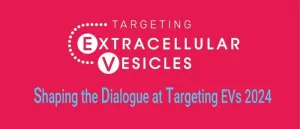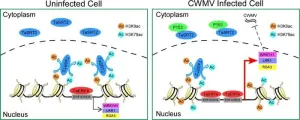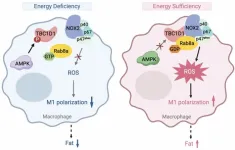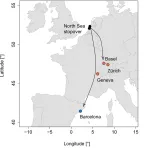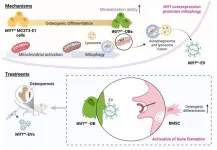(Press-News.org) Malta, July 5, 2024 - The program for the highly anticipated world conference on Targeting Extracellular Vesicles (EVs) has been released. The event, organized by the World Mitochondria Society and the International Society of Microbiota, is scheduled to take place on October 17-18, 2024, at the Corinthia Palace in Malta.
Exploring Strategic Questions at Targeting EVs 2024
The Targeting EVs 2024 conference promises to explore the multifaceted roles of EVs, with a special focus on their interactions with mitochondria and microbiota.
The scientific board has curated a series of stimulating questions to foster comprehensive exploration and strategic discussions.
"Our aim is to discuss and try to answer many strategic questions that remain unresolved", stated M. Edeas, Institut Cochin, INSERM U1016, Université de Paris, France, member of the scientific committee and founder of the World Mitochondria Society.
Key topics to be debated by speakers include:
Non-Standardization of EVs and Exosomes:
- What are the main challenges preventing the standardization of EVs and exosomes in research and clinical applications?
- What steps are being taken by the scientific community to develop standardized protocols for EV and exosome research?
- How do the physicochemical properties of EVs and exosomes contribute to the difficulty in establishing standard practices?
Targeting EVs and Exosomes to Specific Organs and Tissues:
- What are the current methods used to target EVs and exosomes to specific organs or tissues?
- How can surface modifications on EVs enhance their targeting efficiency?
- What role do ligands and receptors play in the targeted delivery of EVs and exosomes?
- How does the microenvironment of specific tissues influence the uptake of EVs and exosomes?
- What are the potential therapeutic benefits of precisely targeting EVs and exosomes to tumors?
- How can EVs be used as vehicles for different cargo and drugs?
Using EVs and Exosomes as Biomarkers:
- Why is using EVs and exosomes as biomarkers still considered far from reality?
- What are the key challenges in isolating and identifying specific EVs and exosomes as disease markers?
- How can advances in high-throughput technologies improve the feasibility of using EVs and exosomes as biomarkers?
- What are the potential advantages of using EVs and exosomes over traditional biomarkers?
- How can multi-omics approaches enhance the reliability of EVs and exosomes as diagnostic tools?
Mitochondria & Microbiota: Crucial Impact
- How do EVs contribute to the optimization of mitochondrial function through protein and genetic material transfer?
- What are the mechanisms by which EVs can spread damaged mitochondrial components, and how does this affect disease progression?
- In what ways can targeted drug delivery via EVs improve mitochondrial-related therapies?
- How do microbiota-derived EVs facilitate communication between microbial communities and host cells?
- What potential biomarkers can be identified from microbiota-derived EVs for immune modulation?
- How can understanding microbiota-derived EVs lead to new therapeutic strategies for managing microbiota-related diseases?
Join us in Malta to engage in these groundbreaking discussions and contribute to the advancement of EV research and applications.
For more information and to view the full program, please visit [conference website link].
About the World Mitochondria Society:
The World Mitochondria Society is dedicated to advancing the understanding of mitochondria's role in health and disease, fostering collaboration among scientists, and promoting the translation of research into clinical applications.
About the International Society of Microbiota:
The International Society of Microbiota aims to bring together researchers and clinicians to explore the complex roles of microbiota in health and disease, fostering innovation and collaboration in microbiota research.
END
Engage in strategic discussions at Targeting EVs 2024: Program released with stimulating questions
2024-07-05
ELSE PRESS RELEASES FROM THIS DATE:
Smoking a key lifestyle factor linked to cognitive decline among older adults
2024-07-05
Smoking may be among the most important lifestyle factors affecting how quickly our cognitive skills decline as we age, suggests a new study led by UCL researchers.
The study, published in Nature Communications, analysed data from 32,000 adults aged 50 or over from 14 European countries who responded to surveys over 10 years.
The researchers investigated how rates of cognitive decline might differ among cognitively-healthy older adults with different combinations of health-related behaviours, including smoking, ...
Current strategies ineffective in controlling Salmonella Dublin in Danish cattle
2024-07-05
Limited impact of current movement restrictions highlights need for enhanced strategies, says study.
In a recent study published in the Journal of Dairy Science, researchers from the Complexity Science Hub (CSH), the University of Copenhagen, and SEGES have shown that despite stringent movement restrictions among Danish cattle farms Salmonella Dublin continues to propagate, indicating that current strategies are insufficient to curb the spread of the disease.
"We analyzed 11 years of data, including detailed information about ...
Military service's hidden health toll: servicewomen and their families endure increased chronic pain
2024-07-05
A new study led by investigators from Brigham and Women’s Hospital reveals that military women and female family members face significantly higher risks of chronic pain
Active-duty servicewomen who served during periods of heightened combat deployments (2006-2013) face a significantly heightened risk of chronic pain compared to those serving at other times, according to a new study from researchers at Brigham and Women’s Hospital, a founding member of the Mass General Brigham healthcare system. The study also found that female dependents of military personnel serving ...
Glucagon-like peptide 1 receptor agonists and 13 obesity-associated cancers in patients with type 2 diabetes
2024-07-05
About The Study: Glucagon-like peptide receptor agonists (GLP-1RAs) were associated with lower risks of specific types of obesity-associated cancers compared with insulins or metformin in patients with type 2 diabetes in this study. These findings provide preliminary evidence of the potential benefit of GLP-1RAs for cancer prevention in high-risk populations and support further preclinical and clinical studies for the prevention of certain obesity-associated cancers.
Corresponding Authors: To contact the corresponding authors, email Nathan A. Berger, M.D. (nab@case.edu) and Rong Xu, Ph.D. (rxx@case.edu).
To access the embargoed ...
Medicare eligibility and changes in coverage, access to care, and health by sexual orientation and gender identity
2024-07-05
About The Study: The findings of this cross-sectional study indicate that Medicare eligibility was not associated with consistently greater improvements in health insurance coverage and access to care among LGBTQI+ individuals compared with heterosexual and/or cisgender individuals. However, among sexual minority individuals, Medicare may be associated with closing gaps in self-reported health status, and among states with the highest disparities, it may improve health insurance coverage, access to care, and self-reported health status.
Corresponding Author: To contact ...
TaSRT2 recognizes a viral protein to activate host immunity by increasing histone acetylation
2024-07-05
This study is led by Dr.Jian Yang and Dr. Kaili Zhong (State Key Laboratory for Managing Biotic and Chemical Threats to the Quality and Safety of Agro-products, Ningbo University). Their findings reveal a strategy that plants use to protect themselves from viral infection by regulating deacetylase function.
In this work, the team found CWMV infection induced H3K9ac and H3K79ac in wheat. Histone deacetylase TaSRT2 is demonstrated to deacetylate H3K9ac and H3K79ac since the levels of H3K9ac and H3K79ac were significantly reduced in TaSRT2 transgenic lines L6 and L8 plants but increased in virus-induced TaSRT2-silenced ...
TBC1D1 is an energy-responsive polarization regulator of macrophages via governing ROS production in obesity
2024-07-05
This study is led by Dr. Shuai Chen (Model Animal Research Center, School of Medicine, Nanjing University, China) and Dr. Hong-Yu Wang (Model Animal Research Center, School of Medicine, Nanjing University, China).
Metabolic and immune pathways are highly regulated and interwoven by multiple mechanisms to govern metabolic health. Dysregulation of these pathways underlies the development of metabolic diseases such as obesity and type 2 diabetes (T2D), which have become prevalent worldwide in recent years. Thus far, the molecular mechanisms ...
Gerhard Ertl Lecture Award 2024 goes to Graham Hutchings
2024-07-05
His journey from a technical officer at ICI Petrochemicals to becoming the Regius Professor of Chemistry at Cardiff University is marked by numerous achievements and accolades, including being elected a Fellow of the Royal Society in 2009.
The Ertl Lecture Award, a tribute to the legacy of Gerhard Ertl, Nobel Laureate in Chemistry in 2007, is an annual accolade that highlights the exceptional work of researchers in the field of catalysis. Sponsored by BASF and established in 2008 by the three Berlin universities (Humboldt University, Technical ...
Migrating starlings are no copycats
2024-07-05
Young, naïve starlings are looking for their wintering grounds independently of experienced conspecifics. Starlings are highly social birds throughout the year, but this does not mean that they copy the migration route from each other. By revisiting a classic ‘displacement’ experiment and by adding new data, a team of researchers at the Netherlands Institute of Ecology (NIOO-KNAW) and the Swiss Ornithological Institute (Vogelwarte Sempach) have settled a long-lasting debate. Their findings are now published in the scientific journal Biology Letters.
The question of how migratory birds locate their migration ...
Osteoblast-derived extracellular vesicles exert bone formation effects by WIF1-mediated regulation of mitophagy
2024-07-05
Osteoporosis is a common disorder, especially in the elderly, characterized by bone loss and increased fracture risk. Treatments target abnormal osteoclast activity but face adherence issues. The disease disrupts the balance between bone resorption and formation. Key factors like Wnt signaling and mitochondrial health influence osteoblast differentiation. However, WIF1's role in regulating mitophagy and osteoblast differentiation remains unclear.
This research investigated the role of WIF1 in controlling the osteogenic differentiation stage of the OB precursor cell line (MC3T3-E1 cells) and assessed ...
